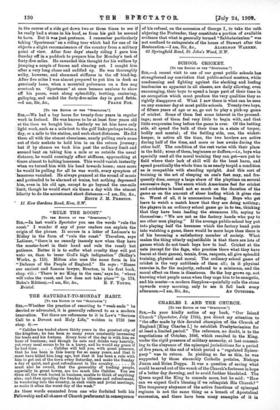SCHOOL CRICKET.
[To THR EDITOR OF THE " SPECTATOR.1 SIR,—A recent visit to one of our great public schools has strengthened my conviction that public-school masters, while condemning and fighting against the slacking and loafing tendencies so apparent in all classes, are daily allowing, even encouraging, their boys to spend a large part of their time in an occupation which must produce the very qualities they so rightly disapprove of. What I saw there is what can be seen on any summer day at most public schools. Twenty-two boys, of fifteen years of age or so, go out to play a pick-up game of cricket. Some of them feel some interest in the proceed- ings; most of them feel very little to begin with, and that little evaporates long before the game is over. Of the batting side, all spend the bulk of their time in a state of torpor, bodily and mental; of the fielding side, one, the wicket- keeper, is active all the time, the two bowlers are active during half of the time, and more or less awake daring the other half. The condition of the rest varies with their place in the field; some of them, beginners or duffers,—i.e., boys who specially need all the moral training they can get—are put to field where their lack of skill will do the least harm, and spend practically the whole time in as nearly torpid a condition as is compatible with standing upright. And this sort of training in the art of sleeping on one's feet may, and fre- quently does, occupy a large share of the playtime on several successive days. The acorn which Americans feel for cricket and cricketers is based not so much on the duration of the game as on the amount of sheer loafing which it gives rise to. Worst of all, it is unconscious loafing. Boys who get leave to watch a match know that they are doing nothing; the players in an ordinary school game go in to tea, thinking that they have been leading the strenuous life, saying to themselves : "We are not as .the factory hands who pay to see other men playing." If the average public-school boy put into playing half the keenness which the factory hand puts into watching a game, there would be more hope than there is of his becoming a satisfactory member of society. What makes the thing utterly unjustifiable is that there are lots of games which do not teach boys how to loaf. Cricket at the nets (except for the fags, who practise there what they have learnt at their games), tennis, fives, racquets, all give splendid training, physical and moral. The ordinary school game of cricket is the very antithesis of them all; in it physical exercise is, for the majority, reduced to a minimum, and the moral effect on them is disastrous. So the boy grows up, not knowing what people mean when they urge him to be energetic, and his master—a modern Sisyphus—painfully rolls the stone upwards every morning, only to see it fall back every


































 Previous page
Previous page